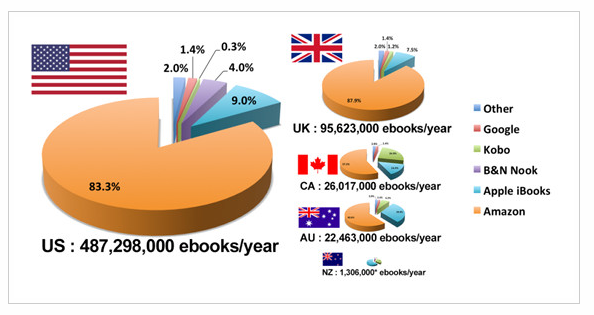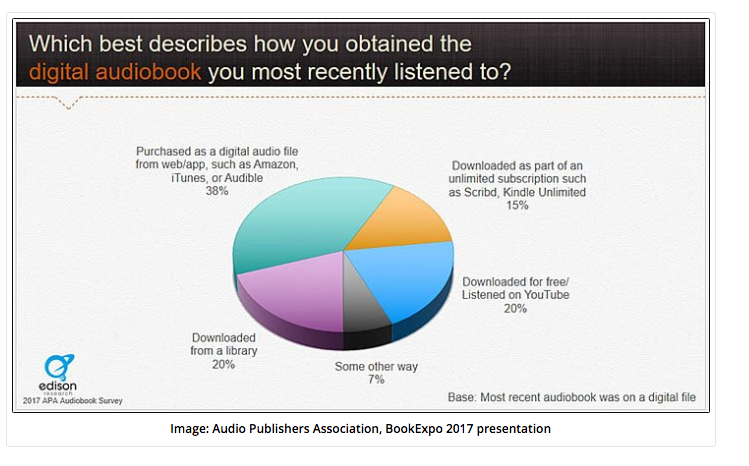You have /5 articles left.
Sign up for a free account or log in.
The news coming of this week about Google and The New America Foundation has gotten me thinking about the dangers of digital platform monopolies.
Which digital platform company’s monopoly power worries you most? Google, Facebook, Microsoft, Amazon, Comcast, Verizon, Disney … who am I missing?
My vote is Amazon. Specifically, I’m worried about the impact of Amazon’s monopoly on digital books.
Books are so critical as the medium in which our culture advances. We should be talking about digital books, and the risks of monopoly power, within our higher ed communities.
Every book that I buy is a digital book sold by Amazon. I buy lots of books, and they are all Amazon Kindle e-books, or Audible (owned by Amazon) audiobooks. Each time I purchase a digital book from Amazon, I find myself worried that I’m complicit in a devil’s bargain. I worry that I’m trading an almost near-term nirvana of low-friction affordable book purchases delivered in the reading medium of my preference (e-book and audio), for a long-term future of limited innovation in books coupled with less choice and higher prices.
The problem is that beyond worrying about Amazon owning my book buying world, I’m not quite sure what an alternative digital book story would look like.
Yes, it would be wonderful if my public or academic library could offer the choice and platform options that I get for digital books on Amazon.com / Audible.com. I’d much prefer to borrow than buy my digital books. As far as I can tell, however, Amazon has little interest in working closely with libraries (either public or academic), and no other publisher or vendor has been able to offer near the technology or catalog or pricing that Amazon can provide for consumers.
It might be the case, however, that my worries about an Amazon digital book monopoly are unfounded.
Playing devil’s advocate to my own Amazon digital book worries, I think that I’d make the following arguments:
Possible Argument #1 - Amazon Does Not Actually Have a Monopoly in Digital Books:
An Amazon defender might argue that there is plenty of competition in the digital book market. A quick look at the data shows that in the US Amazon has an 83.3% share of the e-book market, with Apple having the next highest (9%). I can’t seem to find Audible’s market share for audiobooks (can you help?). Data that I did locate indicates that maybe half all audiobook downloads are from Audible, but a higher percentage of purchased audiobooks come from this Amazon subsidiary.
Does Amazon actually have a monopoly on the digital book market? For instance, am I underestimating the opportunities and scale of library digital book rentals?
Possible Argument #2 - It Matters Less if Amazon Does Have a Digital Book Monopoly, As The Competition Is Broader Than Other Digital Books:
An argument can be made that Amazon’s digital books are not competing with other digital book providers, but with everything else. Amazon’s Kindle and Audible books are competing with paper books and games and Facebook and Netflix and the NYTimes, and anything else that might capture the consumer’s dollar and attention. Amazon, so the argument goes, is incentivized to keep innovation up and prices low in digital books because they are competing against all other media. Even if there is not another digital book provider, there is always a new iPhone game or podcast or HBO episode that can be substituted for a book.
This seems like a pretty good argument. Is competition from adjacent products and services enough to alleviate monopoly risks in a single vertical?
Possible Argument #3 - Amazon Is Winning the Digital Book Competition Due to Innovation:
The last devil’s advocate argument against worrying so much about an Amazon monopoly is that Amazon should be praised, rather than vilified, for its innovation in digital books. Amazon took the risk of developing the Kindle e-reader, and the initial losses to keep e-book prices low. Amazon purchased Audible.com, and has been investing in the division. Amazon has pushed forward innovations such as Whispersync for Audio, while continuing to enlarge both the number of digital books available and the platforms in which they can be consumed. If Apple or Microsoft or Google or a publisher or a digital book startup wanted to offer a better digital book experience at a lower price than Amazon, then they should go for it.
How does one counter this argument?
It is clear that the consumer has benefited from Amazon’s investment in digital books - at least up until now. Amazon does not seem to have the obligation to unilaterally step-away from the digital book market. Nor should Amazon stop innovating in order to make space for new players.
How would you answer these devil’s arguments?
Can you give us a reason to worry less, or worry more, about the power of Amazon when it comes to digital books?


https://publishingperspectives.com/2017/06/audiobook-sales-growth-us-2016-report/




